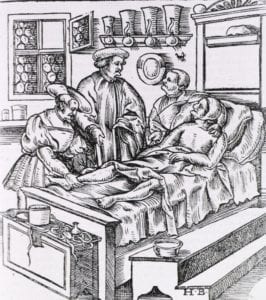Geoffrey Rubin
Mark Abrams
D. Edmund Anstey
New York, New York, United States
 |
| [Bedside scenes: Doctors visit patient]. 1534. The National Library of Medicine. |
In Albert Camus’ novel The Plague,1 Doctor Rieux is a consummate physician, a hero and a “true healer.” His main charge is to compassionately perform his duty—a matter, in his words, of “common decency”—despite the personal risk of infection and death. Rieux embodies the Oslerian ideal of equanimity. But as the epidemic surges, even Rieux feels “vague unease” and “nervous exhaustion.” He becomes “worn out by the incessant strain” and has never “known his profession to weigh on him so heavily.” Physicians and frontline healthcare workers around the world have also felt the weight of their calling during the COVID-19 pandemic, despite newfound “hero recognition” status.
Camus’ novel yields subtle lessons about coping with physician burnout, especially during a pandemic. COVID-19 has created an environment of heightened anxiety that stems from fear of the virus itself as well as sociocultural, political, and economic threats. Camus’ fictional plague similarly “swallowed up everything and everyone.” Physicians and healthcare workers are particularly vulnerable to being swallowed by the psychosocial repercussions of pandemics because of environmental and internal stressors.2
The once-familiar hospital has become a foreign place. Although overflowing with patients, the hallways are transformed into eerily quiet spaces devoid of life and emotion. Colleagues’ identities are obscured by goggles and masks, and many physicians’ roles have been transformed. Camus’ protagonist Doctor Rieux is also forced “to adapt himself to the new conditions of life.” Doctors today must make difficult ethical decisions and communicate devastating final goodbyes between dying patients and their distant families. There is a sense of futility and death in toxic doses, as there is for the exhausted Rieux after treating scores of plague patients. These deaths sometimes feel arbitrary. In The Plague, this feeling is best reflected in the slow, agonizing death of a young child, the son of a judge: “. . . the pain inflicted on these innocent victims had always seemed to them to be what in fact it was: an abominable thing.”
Doctors redeployed to intensive care units and emergency departments often participate in difficult tasks, such as helping dying patients communicate virtually with family or deactivating defibrillators in hospice units. In the pre-COVID-19 hospital environment, feelings of stress were common, but now the usual stressors are compounded by anxiety and fear. This may increase a physician’s risk for burnout, a condition that includes feelings of emotional exhaustion, depersonalization, and a low sense of personal accomplishment at work. Before the pandemic, more than 50% of U.S. physicians already reported symptoms of burnout, a number that will likely increase.3
During medical training, physicians are conditioned to compartmentalize tragic deaths and heartbreaking encounters, but also their own emotions. Such conditioning may result in doctors swallowing their emotions instead of processing them. At the peak of the epidemic in The Plague, Doctor Rieux must “tighten the stranglehold on his feelings,” which “. . . he knew would make his task easier . . .” But after watching the young boy die, Rieux again experiences “a stranglehold lashing his heart with steel” and “felt like shouting imprecations.” He nearly strikes a priest, bellowing, “That child, anyhow, was innocent, and you know it as well as I do!” Doctor Rieux—the gold standard of physicians—is burning out.
There are some strategies that may help to alleviate burnout and benefit mental health in the healthcare setting.4 The act of writing itself unburdens the mind, as thoughts are discharged from brain to pen to paper. Keeping an unencumbered, free-form journal may help physicians to find meaning and counteract burnout. The narrator and fictional “author” of The Plague is eventually revealed to be Rieux himself, an idea that reinforces the healing power of the written word.
Medicine is a collaborative profession and successful self-care requires the support of multidisciplinary colleagues. At the end of each shift, organized debriefings or small group sessions can deconstruct both stressful and rewarding experiences and highlight performances worthy of recognition.5 This concept is demonstrated in the novel as Doctor Rieux finds solace and stress relief in relationships with colleagues. Towards the end of the story, Rieux swims in a moonlit ocean with his friend, Tarrou. Matching stroke by stroke, they are “. . . far from the world, at last free of the city and the plague.”
To treat patients in stressful environments, physicians must monitor their own emotional health. Even Doctor Rieux recognizes when it is “time to put the brakes on and try to get his nerves into some sort of order.” The practice of medicine demands the normalization of extremes. Routine emotional processing and stress-relief interventions ought to be normalized as well. There are valuable lessons to be learned from Camus’ fictional narrative that may be applied to our current situation.
References
- Camus A, Gilbert S. The plague. 1st American ed. New York,: A. A. Knopf; 1948.
- Pfefferbaum B, North CS. Mental Health and the Covid-19 Pandemic. N Engl J Med 2020.
- Prins JT, Gazendam-Donofrio SM, Tubben BJ, van der Heijden FM, van de Wiel HB, Hoekstra-Weebers JE. Burnout in medical residents: a review. Med Educ 2007;41:788-800.
- West CP, Dyrbye LN, Erwin PJ, Shanafelt TD. Interventions to prevent and reduce physician burnout: a systematic review and meta-analysis. Lancet 2016;388:2272-81.
- Abrams M, Cromer S, Faye A, et al. Novel peer-facilitated method to decrease burnout and enhance professional development: the READ-SG prospective cohort study. Postgrad Med J 2020.
GEOFFREY RUBIN, MD, is an assistant professor of medicine.
MARK ABRAMS, MD, is an electrophysiology fellow.
D. EDMUND ANSTEY, MD, MPH, is an assistant professor of medicine at New York-Presbyterian Hospital-Columbia University.
Summer 2020 | Sections | Doctors, Patients, & Diseases

Leave a Reply